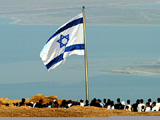|
|
TODAY.AZ / Politics
Israeli forces and protesters clash at Jerusalem holy site
10 February 2007 [02:19] - TODAY.AZ

The confrontation, which took place immediately after midday prayers on the Muslim Sabbath, marked the fourth straight day of Palestinian protests against the Israeli digging next to the mosque compound, known to Muslims as the Noble Sanctuary and to Jews as the Temple Mount.
The clashes quickly spread to other parts of the Old City of Jerusalem and to streets nearby, as Palestinian youths barred from the compound hurled stones at the large Israeli police contingent deployed in the city. Overall, 19 Israeli police officers and 17 Palestinian protesters were slightly injured, and 17 Palestinians were arrested.
Because of the significance of the holy site to Jews and Muslims, any dispute has the potential to ignite a major conflict here and in the wider region. Israel says it is carrying out routine repair work that does not endanger the mosque compound, and that Muslim extremists are trying to manufacture a crisis. But the Palestinians say they fear that the foundations of the mosque could be harmed, and Muslim states have joined in criticizing Israel.
With tensions running high, Israel prevented men under 45 from attending the Friday prayers. But some younger men did manage to get inside, and they emerged from the prayers chanting, "God is great!" They headed toward the police and began throwing stones and bottles at the officers, who were just outside the gate of the compound.
About 200 police then ran into the grounds, firing tear gas and stun grenades. As they chased the stone-throwers, the Israeli police approached the entrances to the two mosques in the compound, Al Aksa and the Dome of the Rock, but did not enter.
"There is no justification for what they did today," Adnan Husseini, the head of the Islamic Waqf, the Muslim trust that runs the mosque compound, said of the Israelis. But Micky Rosenfeld, a spokesman for the Israeli police, said that officers had used "a minimum amount of force to disperse the rioters after they started throwing rocks."
The compound has often been the flash point for clashes between Israel and the Palestinians. The Palestinian uprising, or intifada, erupted there on Sept. 29, 2000, one day after Ariel Sharon, then an Israeli opposition leader, made a visit to emphasize Israel's claim of sovereignty over the site.
The latest controversy began Tuesday when Israel started renovations on a 45-meter, or 150-foot, walkway that leads up to the compound.
The walkway, adjacent to the Western Wall, is used primarily by tourists and some Jews to visit the mosque compound, which is built atop the ruins of the Biblical Jewish temples. The walkway was damaged by a snowstorm and an earthquake three years ago and needed to be fixed, according to the Israelis.
The office of Prime Minister Ehud Olmert of Israel said Thursday that the renovations "do not constitute any damage to the Mount or Islamic holy places. The work is being carried out by professionals and with the complete transparency, entirely for the safety of visitors."
Many Palestinians claim that the Israelis want to destroy the mosques and build a new temple at the site. While some fringe Jewish groups express this desire, Israel says the compound will remain a place for Muslim worship, as it has been for most of the past 1,300 years.
"The Israeli plan is very clear," said Maher Gounamah, 40, a Palestinian money changer. "They want to do something much bigger and they are starting at this point."
The Israeli digging has been the top story for several days on pan-Arab television channels like Al Jazeera. Several Arab states, including Jordan and Saudi Arabia, have been critical of Israel's plans. The president of Iran, Mahmoud Ahmadinejad, said that the "Zionist regime always does something to cause tension and escalate hostility." The International Herald Tribune
URL: http://www.today.az/news/politics/36246.html
 Print version
Print version
Connect with us. Get latest news and updates.
See Also
- 22 February 2025 [11:05]
Reception held in Azerbaijan to mark 65th anniversary of Japanese Emperor Naruhito - 21 February 2025 [16:03]
Armen pinned to the wall, but he resists - 21 February 2025 [11:42]
Azerbaijan-OSCE cooperation discussed in Vienna - 21 February 2025 [11:11]
There is not and could not be an "Armenian heritage" in Agdam - 21 February 2025 [10:56]
President Ilham Aliyev receives Chairman of Turkish Parliament’s National Defense Commission - 21 February 2025 [10:45]
EU observers once again spotted monitoring Azerbaijani territories - 20 February 2025 [12:40]
Italian Senate backs resolution supporting Azerbaijan-Armenia peace process - 20 February 2025 [11:46]
President Ilham Aliyev awards Artur Rasizade 'Heydar Aliyev' order - 20 February 2025 [11:26]
Azerbaijan, Iran discuss strengthening parliamentary ties and regional cooperation - 20 February 2025 [11:11]
There is no limit to perfection: Vardanyan continues to lose weight
Most Popular
 US imposes duties on cars, semiconductors, pharmaceuticals and wood in March
US imposes duties on cars, semiconductors, pharmaceuticals and wood in March
 Turkiye strengthens energy role with Turkmen gas agreement
Turkiye strengthens energy role with Turkmen gas agreement
 Erdogan calls Istanbul talks important platform for parties to reach consensus
Erdogan calls Istanbul talks important platform for parties to reach consensus
 Azerbaijan’s firm stance dispels myths of pro-Russian allegiances
Azerbaijan’s firm stance dispels myths of pro-Russian allegiances
 Azerbaijan, Iran discuss strengthening parliamentary ties and regional cooperation
Azerbaijan, Iran discuss strengthening parliamentary ties and regional cooperation
 Financial gamble: Trump’s war on $200 billion spent in Ukraine
Financial gamble: Trump’s war on $200 billion spent in Ukraine
 Europe is no longer in the game - it has been shown the door
Europe is no longer in the game - it has been shown the door
